R.W.W. Greene's Blog, page 3
June 26, 2024
While My Keyboard Gently Weeps
I repaired a shed and a door and a stair tread, but mostly the shed.
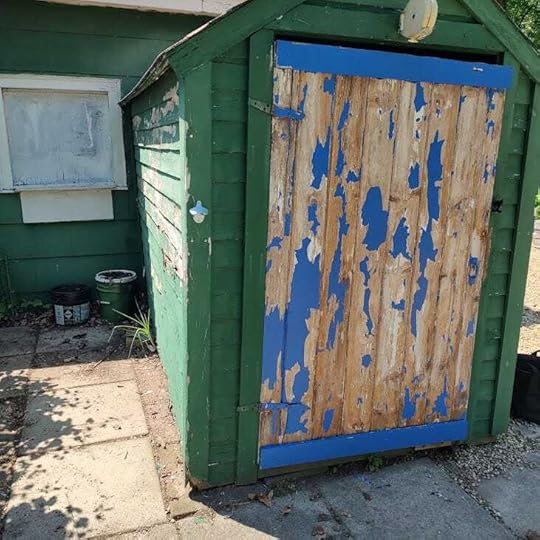 The shed. Call it Ned.
The shed. Call it Ned.It came with the century-old house we bought seventeen years ago, and I estimate (based on the type of nails used in its construction) that it might be forty-years old. After the cladding came off that left side, I discovered the sill there was rotten through.
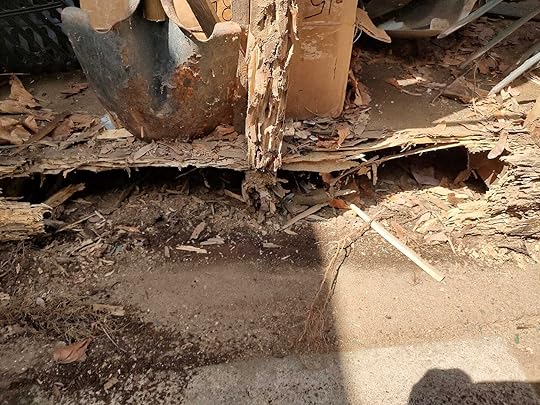 Uncool.
Uncool.I replaced the sill only to learn no one still made replacements for the tongue-and-groove beveled cladding. I improvised, and I improvised some more on the right side to fill in the rotting frame of a window we no longer needed. (The right sill was fine, BTW.) I repainted and rehung the door, and now I am in the process of repainting the whole thing.
The stair tread was pretty easy, although cleaning the space under the stair unit was not. I needed to replace the tread so I could move our washing machine and dryer (both well broken) out of the basement to make room for the new. Our neighbor’s tenant left their washer and dryer behind, and we’re inheriting them.
I also picked and pitted a lot of cherries. Our bush cherries are bountiful this year. The mulberry tree was particularly fecund, too, and the peaches and apples are looking good.
I nearly forgot! I also fixed up the front porch and started repairing a wooden chair.
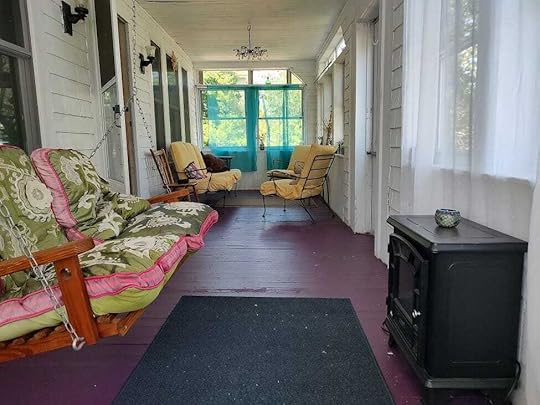 Porch
Porch
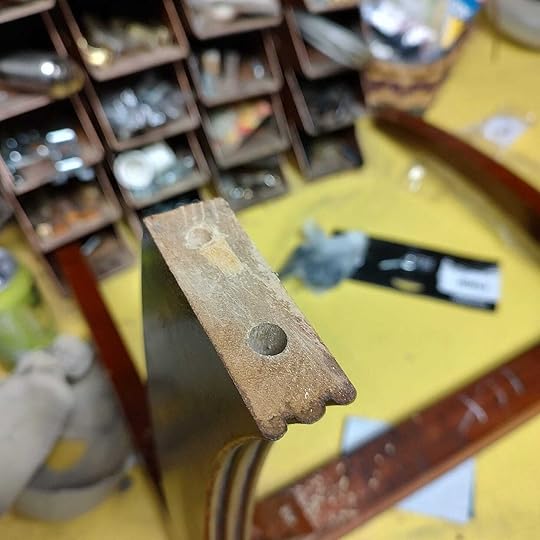 Chair.
Chair.I forgot to talk about the door, but that’s OK. It’s just a door on the garage. I stripped the peeling paint off it and repainted it.
I cleaned and reorganized the basement. Painted the floor there, too.
All these chores are necessary, but their real value is as a distraction from the first draft of a novel I’ve left cooling/rising/whatever in the drawer. I like to put some time between the first draft and the first revision. It gives me a chance to forget what I wrote and that I wrote it at all. I can approach the thing with new eyes and WTF attitude.
It’s almost time to reopen the file.
Almost.
Time.
Thanks for reading twenty-first-century blues! Subscribe for free to receive new posts and support my work.
June 11, 2024
Generation eXit
Thirty years ago, the undergraduate Class of 1994 -- I’m writing specifically about my class (430-ish strong from Wheaton College in Massachusetts) and generally about all the Classes of ‘94 -- left campus to follow our dreams of career, family, money, and making a difference. Little did we know we’d disappear.
Our graduation speaker, CBS anchor Connie Chung, related a dream in which she shat in a garment bag, and Wheaton president Dale Rogers Marshall, in her speech, quoted a line from a column I’d written recently for the school paper … some trite bushwa about feeling old and tired and wise and stupid.
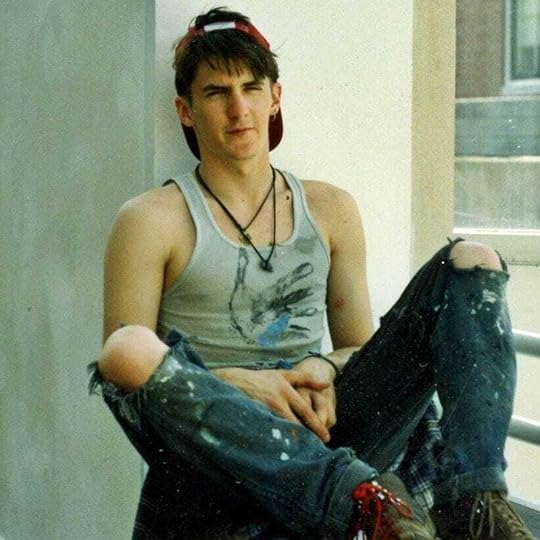 The author, at college in 1994.
The author, at college in 1994. The Class of ’94 was born in 1971-72, putting it squarely in the middle of Gen X (1965-1980). We were told we’d be the the first generation in history that would be less successful than our parents, that the careers we’d end up in probably didn’t exist yet, and that we’d have to be ready to switch jobs every eighteen months or so. When we graduated, Bill Clinton was in office. He was a breath of fresh air compared to the twelve years of Reagan-and-Bush before him but also several different flavors of terrible.
In the self-reported ‘Class Notes’ section of the Wheaton Quarterly, the mid-to-early Nineties classes have never been well-represented. The same names, the same faces. It stands to reason that some of that absence is due to the hard feelings engendered when Wheaton went co-ed in 1988, but some of it appears to be a vanishing act, willing or otherwise. ‘Famous’ alumni from the time period are thin on the ground. We’ve done OK for ourselves, but we’re not, ya know, leading.
Maybe it’s the Gen-X thing.
“I thought we would have done more by now,” said my spouse, driving home from my 30-year Wheaton reunion last month.
She’s also a Gen Xer, part of the so-called ‘slacker generation’ with Elon Musk (1971) and Mark Zuckerberg (1984). World leader-wise, we get Justin Trudeau of Canada (1971) and Emmanuel Macron of France (1977). Ten years ago, only one of the world’s most populous countries had a leader seventy or older. Now, eight of them do, and the new president of Mexico, Claudia Sheinbaum, is a Boomer.
The average age of the U.S. Congress has been increasing since 1981, and the 118th Congress is the third oldest Congress since the late 18th century. In the Senate, only 10 of the 100 senators are under 50, with a median age of 65.3 years. The average age in the House is 56.8 years. The youngest Baby Boomers will turn 60 this year, the oldest are almost 80. The oldest Gen Xers will be 60 in 2025; the youngest a sprightly 45.
Beyonce (1981) and Taylor Swift (1989) are both Millennials. Dave Grohl (1969) is Gen X, as is Alanis Morrisette (1974). Both Bjork and Beck are ours, thank goodness.
Gen X literary luminaries include David Eggers (1970), Zadie Smith (1975), Gary Shteyngart (1972), Colson Whitehead (1969), and Celeste Ng (1980). Colleen Hoover (1979) and J.K. Rowling (1965) made it in, too. Chuck Palahniuk (1962) and the Jonathans Letham (1964) and Franzen (1959) are fuckin’ Boomers. So is Brett Easton Ellis.
Where are the rest of us? Where is the Voice of Gen X? Where are its leaders? What is our rallying cry? We had all kinds of dreams and ideas when we graduated … didn’t we? We had rocked, right?
The fact that Gen X is oft forgotten has become a running joke at this point, almost click bait. But maybe we made overlooking us too easy. For years, we went home after school, let ourselves in the house, made a snack, and sat down to watch television. Are we still doing that? Or are we waiting too patiently for it to be our turn, maybe not realizing that the Boomers aren’t going anywhere and that the Millennials are coming up fast?
Does it matter?
Or is it, like, well … whatever?
Thanks for reading twenty-first-century blues! Subscribe for free to receive new posts and support my work.
May 22, 2024
The Nothing Between the Stars
Rob Note: I took this one out of storage for a reading recently. It was originally published in Daily Sci-Fi, somewhen in 2017.
The Poet, a mound of lime-green flesh in a tank of 35-degree Celsius ooze, squelched. Its cilia rowed slowly to keep its massive body centered and upright, navigating the torpid jets that kept it oxygenated. The ooze smelled like horse sweat and roses, and the Poet gurgled when it laughed to itself. Its nucleus, the center of all of its art and beauty, drifted like thought inside its dimpled membrane.
Amelia lifted her hand to her mouth and swallowed the pills inside. She coughed politely.
“Salutations,” the Poet said. There was a computer inside the tank and a ring of speakers outside of it. Humans weren’t nearly quick enough to decipher the rapid sphincter contractions the Poet used to communicate with its own kind. It took sophisticated computers to translate the vibrations into Earthspeak. The computer-generated voice was deep and mellifluous. Amelia wondered if the Poet had picked it or if the computer had assigned it at random.
 Photo by Jeremy Thomas on Unsplash
Photo by Jeremy Thomas on Unsplash“Hello,” she said. “Amelia Banks. I’m to serve as your liaison to the Arts Council.”
“Do you write?”
Amelia nodded, not sure if the Poet understood the gesture. “Some,” she said.
The Poet consulted the computer. “On matters dark the universe ponders/ And on the spaces between us all,” it recited. “It’s quite beautiful.”
Amelia’s face heated. “Thank you. Graduate-school drivel. It’s really nothing.”
The Poet gurgled. “Which was your point.”
She laughed. “True.”
“Is that why you were chosen to liaise with me?” the Poet said. “Your writing?”
“I suppose it helped. I’m well-educated and published, but not famous enough to have an ego.” She smiled. “Or not much of one.”
“By that logic,” the Poet said, “I must have an ego the size of a moon.”
“Do you?” she said.
“The most famous writer in two star systems? Of course. But I don’t let it go to my head.” It gurgled loudly.
Amelia smiled. “Had I head, I would not know down from up.”
“Led blindly by the nose, instead of guided by all gravity’s directions.” The Poet finished the stanza. “It was better before it was translated. That collection has not been released in this system yet. How do you know it?”
“Inside information,” she said. “A benefit of being your liaison.”
The Poet hummed to itself and squelched in its tank. “How should we get to know each other, Amelia Banks?”
“We could talk,” she said.
“Most definitely. And you can share more of your work with me.”
She dipped her head. “I’d be honored.”
“The honor would be mine.” It slid to one side of the tank. “Join me. The fluid is warm, and humans find it pleasing. It’s even good for the skin.”
Amelia laughed. “I didn’t bring a swimsuit.”
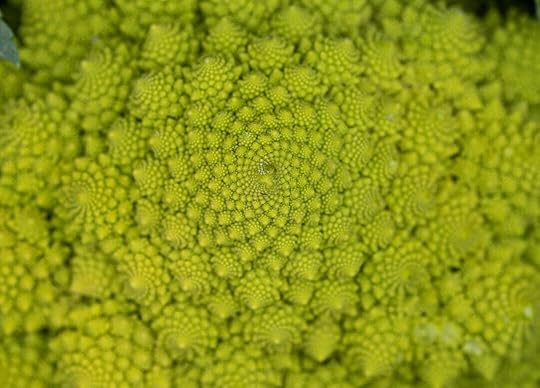 Photo by blackieshoot on Unsplash
Photo by blackieshoot on Unsplash“Propriety will not be stirred.” A motor hummed, and a seat unfolded from one inside wall of the tank. “Come in. We’ll talk.”
Amelia shed her clothing. Her manicure clicked against the ladder rungs as she climbed the side of the tank. She stuck a toe in the ooze. It was thicker than she’d expected, like baby oil, and nearly blood warm. The Poet drifted closer to Amelia’s side of the tank. “Fear not, dear friend, but freely live your days,” it said.
Amelia put both feet in the tank and sat on the edge. “Robert Louis Stevenson. I doubt he would have known what to do in my place.”
“The human race has advanced much since then. Sailboats to fusion ships. Exploitative colonialism to partnerships across the void.” The Poet shifted, and the surface of the ooze rippled, sending a fresh wave of pheromones into Amelia’s face. “Come now. One small step --.”
She slid the rest of the way into the tank and hooked her feet under the seat’s supports to hold herself in place. Chemicals in the brew began to work on her, creating feelings of relaxation and euphoria.
“Let yourself float,” the Poet said.
“My hair --.”
“You’ll find it washes out easily enough.”
Amelia unhooked her feet and stretched out in the tank. The Poet floated nearby. “Have you ever been off planet?” it said.
“Off Earth? No. My brother went, but he’s home now.”
“Is he a writer, too?”
“Was. There was an accident.”
“I listen to the water on nights I drink away,” the Poet said. “And the sadness becomes so great I hear it in my clock.”
“Bukowski knew a bit about grief, I think,” Amelia said. “It’s worse, maybe, that my brother isn’t all the way dead. My mother can’t bear to pull the plug. He’s a vegetable.”
The Poet slid closer. Amelia felt its cilia like a breeze on her arm. “Allow me to recite something in my own language,” it said.
“I won’t understand it,” she said.
“Not the words.” The Poet moved closer. “But you will know the feelings behind it. I call it ‘Ode to Sadness’.” The Poet ordered the computer to discontinue its translation and began to recite, sphincters all over its body opening and closing rapidly, setting up patterns of soft force in the ooze.
The vibration moved over Amelia. It touched her everywhere, relaxing tense muscles, massaging her scalp, warming and loosening her thighs. The next stanza buzzed even deeper inside, moving Amelia to tears and joy, arousing her. The Poet secreted hormones into the ooze to enhance the bond.
Amelia moaned. The Poet covered her, tasting her with a thousand eager tongues, pushing her under the surface of the ooze. It was careful to leave her face above the surface. It had made mistakes in the past. Humans were fragile creatures.
The third stanza put her over the edge into ecstasy. Amelia moaned and wrapped her arms around the Poet. The first orgasm took her, and she dug her artificially sharp fingernails into the Poet’s tough outer membrane, tearing it open. The Poet exploded, its last words rumbling into the mix of ooze and cytosol with orgasm number two.
Amelia pulled herself onto the edge of the tank. There hadn’t been any cameras when her brother had climbed into the Poet’s tank years before, and there likely wouldn’t be any now. She wrung the scented ooze from her hair. The hormone blockers she’d taken had kept her from the worst of the Poet’s powers; her need for it would be little more than a pang compared to the raw need suffered by its other conquests.
“Into the dark we go,” she recited. “Alone together. Together alone.”
Unpublished, unheralded, the rest of its span lost in her brother’s damaged brain, the verse faded into the nothing between the stars.
Thanks for reading twenty-first-century blues! Subscribe for free to receive new posts and support my work.
May 8, 2024
A Carnivore Looks at Life at 50
My spouse and I went down to one car during the pandemic -- we both work at home now, and of late I’ve been experimenting with other ways to walk more softly upon the Earth. My carbon-and-etcetera footprint has never been huge, but I’ve done my share of damage over the past (Holy Hell!) half century.
I’m mostly vegetarian these days, in part for the planet and in part because I want to stop eating things that exhibit play behavior. My first sighting of vegetarianism came due to a James Blish novelization of the Star Trek episode “All Our Yesterdays.” In the episode, Spock and McCoy are trapped five-thousand years in the past, and Spock begins to revert to the ways of his violent, meat-eating ancestors (the idea being that the modern Vulcan has evolved beyond the point of needing to take animal life to survive). Later, in the late 1980s in Maine, I dated a vegetarian who was pretty much limited, when we went out, to Wendy’s baked potatoes and french fries. Now, that I’m learning to cook vegetarian, I’m a much better boyfriend.
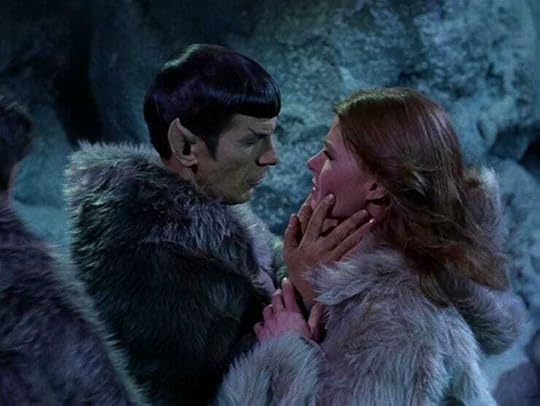 Spock readies to lick bacon grease off Mariette Hartley’s lips.
Spock readies to lick bacon grease off Mariette Hartley’s lips. I’ve always been a thrift-store guy, but now I’m trying to cut leather out of my wardrobe. As my leather goods wear out, I replace them with something that never had a pulse. I started with my watchbands, brown and black. This got complicated because I’m trying not to do synthetics, either, so I ended up with two identical hemp watchbands that suggest I’m much more fond of reggae than I really am. Still, problem solved.
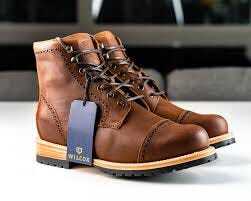 I loved these things.
I loved these things.The boots went about six months ago, the beautiful brown leather boots I bought myself as an early retirement present in 2017, the only shoes I’ve owned that caused random strangers to compliment my taste. Nothing leather-esque seems as good as the real thing, so I switched to fabric. I’m not sold on them yet. They’ve not proven how well they’ll hold up. The black boots, ten-year-old Docs, I mostly use for shoveling snow.
My brown leather belt went last month. It’s probably twenty years old and served well until the very end. I’m probably going to go hemp again, although I haven’t bitten the bullet. As long as I wear the black canvas boots when I leave the house, I can continue to wear the one leather belt -- also about twenty years old -- I have left.
I am under no illusions that I’m saving the planet or sparing hundreds of animals from the slaughterhouse. The world doesn’t work that way. And, yes, I know if the situation were reversed, those belt-and-boot-making cows would be happy to eat me and turn my hide into fashion, but I have thumbs and money enough for “chicken nuggets” made from pea protein and they do not.
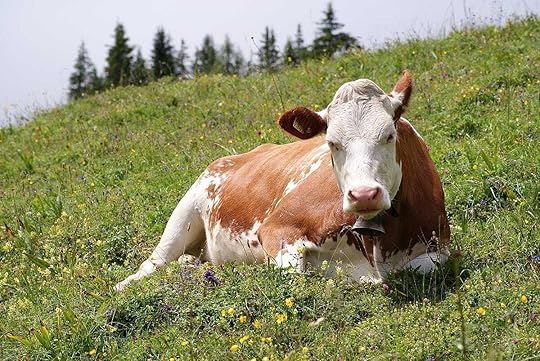
And if I can walk a little lighter and have the capacity to demonstrate the results of all those years of evolution and human civilization, shouldn’t I? Yeah, probably.
NEWS: My thirtieth college reunion is coming up, and number thirty-five for high school. That’s crazy. My brother and his very cool spouse just had a baby, so welcome to the family Jasper. Pride Month is nigh, and I’ll be appearing virtually at UK’s Cymera Festival June 2. Meanwhile, my agent Sara Megibow is shopping a new book around, I’ve another one in the bag, and yet another on my plate.
Until next time, friends, walk easy. -Rob
Thanks for reading twenty-first-century blues! Subscribe for free to receive new posts and support my work.
April 23, 2024
'Cowboy Carter' and Me
This is a little experiment in format. If y’all like it, maybe there will be more. -rob
Thanks for reading twenty-first-century blues! Subscribe for free to receive new posts and support my work.
April 9, 2024
Wisdom from Ursula K. Le Guin
In this age of massive digital-storage spaces, I am a bit of a pack rat, and I ran across this bit of Ursula wisdom while organizing some files today. I think it holds true:
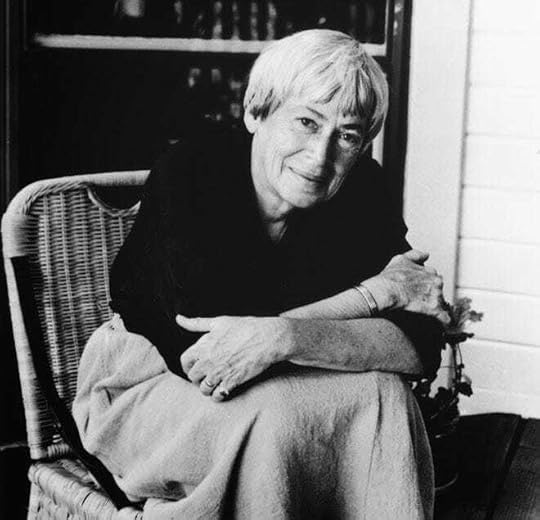
"I think hard times are coming, when we will be wanting the voices of writers who can see alternatives to how we live now, and can see through our fear-stricken society and its obsessive technologies, to other ways of being. And even imagine some real grounds for hope. We will need writers who can remember freedom: poets, visionaries—the realists of a larger reality. Right now, I think we need writers who know the difference between production of a market commodity and the practice of an art. The profit motive is often in conflict with the aims of art. We live in capitalism. Its power seems inescapable; so did the divine right of kings. … Power can be resisted and changed by human beings; resistance and change often begin in art, and very often in our art—the art of words. I’ve had a long career and a good one, in good company, and here, at the end of it, I really don’t want to watch American literature get sold down the river. … The name of our beautiful reward is not profit. Its name is freedom." —- Ursula K. Le Guin, while accepting her Medal for Distinguished Contribution to American Letters, at the 2014 National Book Awards.
Thanks for reading twenty-first-century blues! Subscribe for free to receive new posts and support my work.
March 29, 2024
Twenty-Five Sci-Fi E-Books for $15!
You heard it here, friends: sci-fi-loving readers of e-books can pick up my second novel, Twenty-Five to Life, as part of a Cyberpunk Bundle offered by the fine folks at Fanatical. The price range runs five books for $5, ten for $8, or 25 books for $15. It’s a sweet deal with a lot of great titles involved.

Beyond my own offering, I’ve read quite a few of these. Might I suggest HellSans by Ever Dundas, The Phlebotomist by Chris Panatier, World Running Down by Al Hess, Moths by Jane Hennigan, The Subjugate by Amanda Bridgeman…
Hell, at these prices, just get them all. Fill your e-reader for the whole summer and enjoy.
In other news, I’ve a short story coming out in Metaphorosis Friday, April 5th. It’s the first short I’ve had out in a while, and I’m grateful to Metaphorosis for picking it up. The story was inspired by a box of warped and mildewed record albums.
In other-other news, it looks like our honeybees survived the winter! It’s volunteer hive, meaning the ladies just showed up from somewhere and took over an empty hive, and I am happy they chose to stick around. We supplemented their honey stores with sugar and crossed out fingers.
That’s it, chums. Until next time. -rob
Thanks for reading twenty-first-century blues! Subscribe for free to receive new posts and support my work.
March 12, 2024
How to Write a Book Review
Friends, a book review has three parts, made up of at least three paragraphs. Part one is the summary of content, part two is the critical assessment, and part three is the answer to the Big Question.
The summary of content is generally one to three paragraphs long. In this part of the review, you tell the reader what you are reviewing, who made it (including some other things they may have made), what genre and subgenres the thing represents and what the thing is generally about. Important: This is not a summary. You are writing a review to let people know whether or not they should try it, not to tell them the ending. Don’t be a spoiler!
“Should your reader seek out the thing you are reviewing, and try it herself? Why or why not?”
The critical assessment can be one to three paragraphs. In here you get down to brass tacks: What you liked about the thing and what didn’t work for you. Maybe the plot was great but the characters seemed fake. Maybe there was too much garlic or not enough banjo. Maybe the dialog was fast and realistic, but the costuming was weak. Important: It’s not enough to say that you liked or did not like something; you have to say why.
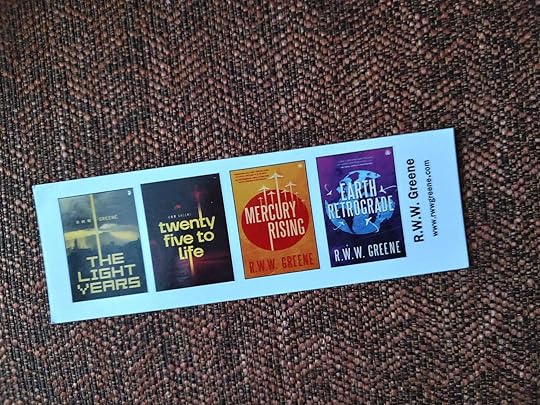
Your review will end with the answer to the Big Question, which usually takes the form of a short paragraph. The Big Question is: “Should your reader seek out the thing you are reviewing, and try it herself? Why or why not?”
Sample Book Review
A nearly Perfect Circle
Touted as a cross between Stephen King and playwright Henrik Ibsen, writer Sean Stewart is a rare find — an author who keeps you in the dark. Stewart’s tale, Perfect Circle, is a ghost story of sorts. Protagonist William “Dead” Kennedy was born with the ability to see ghosts and it hasn’t helped him out much.
Dead Kennedy (DK) is a slacker, recently fired from a pet store job because he ate cat food in front of a customer to prove a point. It’s only the latest in a series of dead-end, low-skill jobs he has held since his wife left him for a Marine 12 years ago. His short marriage resulted in a daughter, who DK gets to see about once a month. DK doesn’t drive a car — in the dark he can’t always tell the dead from the living, a fact that has resulted in a couple of accidents — and his soon-to-be teenage daughter is losing her interest in the monthly trips, via bus, with her wastrel father.
Enter a distant cousin with a ghost problem; he claims he’s being haunted by the spirit of a girl he ran down with his car. DK also is haunted, by the love he still has for his ex-wife, his failures as a father, by certain tracks on his favorite CDs and, eventually, by a ghost who vows to kill everyone DK loves.
Stewart’s writing is occasionally beautiful; some of his descriptions of happenings and scenes — and DK’s inner monologue — stay with you solely for the grace of the writing. His character development skills are also strong: DK is a wreck but you can’t help but liking the guy. (He also utilizes one of the best unarmed combat strategies I’ve ever read.) The book’s ending is a little rushed, however, with a tipping point that smacks more of “god in the machine” than logical plot and character progression.
I’m new to Stewart’s writing and was happy to find out that he wrote seven novels prior to Perfect Circle. Now, while waiting for his next book, I can busy myself with his earlier efforts. You should check him out, too.
This sample is perhaps longer than it needs to be. A paragraph truly needs not be more than a single sentence. That’s, like, three good sentences per review!
Feel free to practice your new skills on any or all of my books. The Amazon algorithm likes that kind of thing, and a review helps me out by letting other readers know about them. You can post reviews at Amazon, Barnes & Noble, GoodReads, Edelweiss, or Your Local Library’s Online Book Catalog. Try it out on all the books you enjoy!
Many thanks and much love. -rob
Thanks for reading twenty-first-century blues! Subscribe for free to receive new posts and support my work.
February 27, 2024
How Lurlene Learned to Love Herself
A little free fiction. Originally published in Stupefying Stories.
Lurlene had almost thrown it out when she hauled Buddy’s things to the curb after their last big fight and came closer yet when he called a year later to ask her to take him back and, by the way, bail him out of jail.
The Super Dupe-R had been on the market for barely three months before the world’s governments had raced in with their lobbyists and laws. Buddy had found one, still in the box, during a demolition job when times were good and hauled it home. Lurlene might have been able to sell it years ago and buy her mother some of the pricey pain pills that were the only thing that gave her any peace at the end, but fear kept her from putting it on Craigslist. Possession of forbidden tech was a felony, and, although she’d cleaned up her act quite a bit since her bad old days, Lurlene couldn’t afford another one of those.
Now she stood over it and picked packing peanuts off the cheap, white plastic. It was a dead end, just like her. Lurlene's father left when she was a baby, and, even though Lurlene had come home to take care of her, her mother had died cursing her failure to measure up. She’d wasted far too much time on Buddy, who proved himself to be a first-class peckerwood. She was unloved, maybe even unlovable, and she’d had enough. Lurlene connected the Super Duper to her kitchen tap and poured the sacks of pre-mixed nutrients into the dispenser. She ran a sterile cotton swab around the inside of her mouth, dropped the swab into the analyzer, and pushed the big, red button.
Lurlene opened the hatch gingerly, half expecting to see one of the abominations the preachers had predicted -- two heads, maybe a tail and horns, heart pumping arrhythmically outside of its body.
A week later the “done” bell sounded. Lurlene opened the hatch gingerly, half expecting to see one of the abominations the preachers had predicted -- two heads, maybe a tail and horns, heart pumping arrhythmically outside of its body. Instead, the little girl inside was pink and perfect, biologically five-years-old with a preloaded, state-approved education.
The girl blinked as her eyes tested the light for the first time. “Are you my mommy?” Her accent was American standard, just like the actors on the soaps Lurlene watched every day.
“I’m your mama,” Lurlene said. “And you’re my little girl.”
The girls’s head had been pumped full of oxytocin to enhance the likelihood of a solid bond. She beamed like sunlight. “What are you going to call me, Mama?”
“Delia. That was my grandma’s name. Delia Lambeaux.”
Little Delia held her arms out. “Pick me up.”
Lurlene wrapped the girl in a warm, dry towel and they rocked in her mother’s chair until it was time to make lunch. She dressed Delia in hand-me-downs and made them each a fried bologna sandwich.
“This is good, Mama!” Delia said.
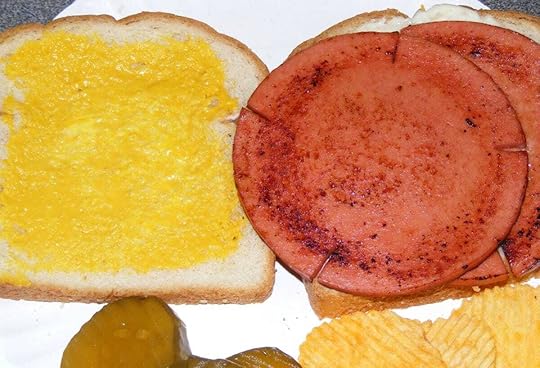
Lurlene smiled. “I made it just like my mama used to. She taught me everything I know about …” She thought for a moment. “About everything, I guess.”
Delia took a nap after lunch, waking in time to watch the soaps. Lurlene did her best to explain who all the characters were, and who loved whom and who hated what. The next morning, she made liver mush and grits, and they walked hand in hand to the trailer-park swimming pool.
“I love it, Mama!” Delia splashed in the pool for hours, blow-up water wings forcing her into an awkward dog paddle.
Who is she?” a neighbor said, her soft arms rippling like vanilla pudding as she fanned herself with a magazine.
“My cousin’s daughter,” Lurlene said. “Daddy’s side. You never met her. She’s from up north.”
The neighbor nodded sagely. “She favors him.”
Lurlene and Delia stopped for a Moon Pie and an RC Cola on the way home, took a nap together, and spent the afternoon watching the soaps.
The machine’s instructions had warned that Delia’s growth hormones would take a while to stabilize, so Lurlene took it in stride when the girl was ready for her tenth birthday party a week later. Lurlene made the cake herself, and they ate half of it while sitting on the trailer’s small porch and watching insects fry on the zapper.
“Where’s my daddy?” Delia said.
Lurlene had avoided the word “clone” around the girl. “He died before you were born, baby girl.” She fought back tears so real she almost believed them. “He would have loved you so much.”
Delia’s bottom lip stuck out. “Why don’t we have any pictures?”
“Looking at them made me sad, so I burned them all up.” A character on their favorite soap had done something similar the week before, so the answer made sense, dramatically speaking.
“Did you love him?”
Lurlene pulled the girl into her arms and breathed in the clean smell of her hair. “Not as much as I love you.”
The next day they went to the pool to cool off. “Who is she?” said the soft-armed neighbor
“Another cousin,” Lurlene said. “T'other one's older sister.”
“Alike as two peas,” the neighbor said. The women around her nodded.
That weekend, Delia snuck out. Her body was fifteen, her features hinting at the good-looking woman she might grow into. Lurlene found her necking with a neighbor boy in a tree house. They had their hands up each other’s shirts and blinked wide-eyed and wild at the sudden illumination Lurlene cast into their secret space. The next night, Lurlene fired up her stun gun to rescue Delia from Woody Wilson, a middle-aged n’er-do-well who was plying the girl with booze and cigarettes. Lurlene left Woody unconscious, britches around his ankles, and took her daughter home to mend. She spent the night covering the girl’s forehead with cold washcloths and holding her hair back while she emptied her stomach in the trailer’s tiny bathroom.
“I love you, Mama,” Delia said, finally sober and pain-free enough to sleep.
Lurlene sat up all night to keep her nightmares away.
The next week, Delia ran away with an older boy. He had a car and rolled packs of cigarettes into his T-shirt sleeves. Delia was biologically seventeen years old and had “Wild Thing” tattooed on the back of her neck. They stole all the money Lurlene had in the trailer and left a cloud of dust in their wake. Lurlene was dry-eyed as she watched them drive away. She’d left home about the same age, about the same way. She cleaned the trailer from top to bottom, pushed the self-destruct button on the Super Dupe-R, and hauled the ashes to the curb. She watched the soaps alone and cried. The next day she got a postcard from Las Vegas.
Delia came back two weeks later. She was tall, skinny, twenty-something, and chain-smoking. Her halter top and cut-off shorts revealed several more visits to the tattoo parlor. “He left me,” she said. “Said I was getting too old for him.”
“They do that.” Lurlene grimaced. “You want something to eat?”
Delia turned and beckoned to the car parked on the roadway. The passenger door creaked open. “Come meet your grandma!”
Tears stacked up in Lurlene’s eyes as she watched the little girl skip across the hard, red dirt. The girl stopped about halfway and put her finger in her ear.
“She’s come over shy,” Delia said. She patted her leg. “Get on over here!”
The little girl walked the rest of the way, giving Lurlene a good look at her. She was skinny, her hair needed a wash, and her elbows and knees were scabby and bruised.
“She likes to run,” Delia said. “And I can’t keep her out of trees.”
“Come here and give me a hug.” Lurlene held her arms out. “I’m your grandma.”
The girl stopped just out of range. “You look like my mommy,” she said.
With little more than ten biological years separating them, Lurlene supposed she did. “Your mama was my little girl,” she said. “What’s your name?”
“Ashley.” The girl kicked at a rock. “I’m five years old.”
Lurlene pulled her eyes off the little girl and found Delia’s face. “She’s beautiful.”
Delia nodded. “Lucky she don’t take after her daddy. Guess I don’t, either.”
“You know about that.”
Delia scratched the faded needle scars inside her elbow. “Weren’t hard to figure out.”
“I always wanted a little girl, but I couldn’t have one.”
Delia lit another cigarette. “Doctor says my growth hormones have settled down. I'll age normal from here on out.” She nodded at the girl. “Hers are stable, too.”
“I’m sorry I didn’t tell you.”
“I’m here now. Don’t much matter how it happened.” She took a long drag of the cigarette and ground it out under her flip-flop. “Need you to watch her a while. I got into college upstate, and she needs to go to school. Make friends.”
A normal life. “I can do that.”
Delia dropped to her knees in front of her daughter and pulled her into a rough hug. “You stay with your grandma.”
“How long?” the girl said.
Delia wiped at her eyes with the palms of her hands. “Until I get back. I'll come visit.” She stood up. “You mind her, hear? Be a good girl.”
The girl nodded.
Lurlene bent to take her granddaughter’s hand and with the other she took Delia’s. “I love both of you,” she said. “I’m proud of you, too.”
“I love you, too, Mama,” Delia said. “I’m sorry I left the way I did.”
“It don’t matter. Just make it count for something. Don’t be like me.”
Lurlene and the little girl watched Delia drive away. This time there were no clouds of dust.
“You hungry?” Lurlene said.
The girl nodded.
“Let’s go inside and I’ll make you something. We can put the TV on. My soaps are about due.”
The little girl took her hand and followed her into the trailer. “Do you have any books?”
The soaps had never been much comfort anyway. Watching people whose lives were better and brighter than hers. “No, but there’s a library in town. Let’s eat then you and me will go see.”
Thanks for reading twenty-first-century blues! Subscribe for free to receive new posts and support my work
January 23, 2024
The Dumbest Firstest Primary
I’m working the polls for New Hampshire’s first-in-the-nation Presidential Primary today, and there’s not an ounce of me that wants to be there.
It’s not the hours, although they are brutal. They start at 5am and run fourteen turns of the glass (with an hour off for lunch) on a good day. Today, because of all the write-ins, will not be a good day. At 52, I am one of the younger poll workers, and as the day progresses I can see my co-workers whither.
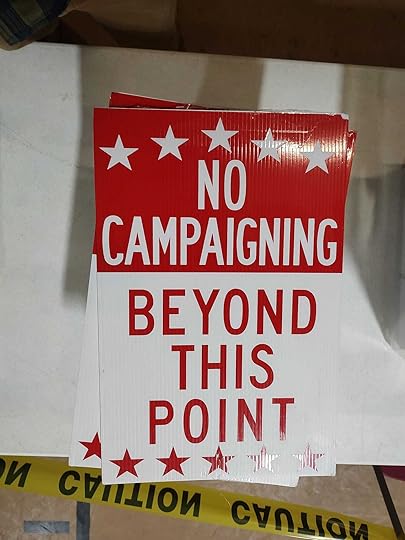
Because of stupid games between the national and state parties, the front-runner on the Democrat side, Joe Biden, isn’t even on the ballot. This is where the write-ins will come from. There is literally a write-in campaign for the Anointed Octogenarian. “Write-In Biden.” The Democrats are not on my Good List.
Ron DeSantis bowed to the inevitable and dropped out of the race yesterday, leaving Nikki Haley and the Other Guy -- the twice-impeached, criminally liable, multi-indicted, insurrectionist conman -- leading the Republican ballot. An obscene amount of money is being spent on that race, which, barring prison (maybe!) is a foregone conclusion. The Republican Party is giddily goose-stepping toward a cliff and carrying the rest of us along.
We’re expecting a lower-than-usual turnout of Dems, because of the Stupid Game, and a higher-than-usual amount of Republicans, eager for another chance to kiss the ring of the Crook Who Would Be King.
This is the Stupidest Primary. I don’t want to see it, much less be part of it. I usually enjoy working the polls. There’s camaraderie and a common, civic sense that we’re all in this together. I usually thank people for coming out and voting.
But maybe not today. I can play dumb with the best of them, but maybe not this dumb. Maybe I’ll say, “Abandon all hope ye who enter here.”
Thanks for reading twenty-first-century blues! Subscribe for free to receive new posts and support my work.



